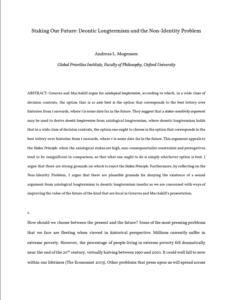Staking our future: deontic long-termism and the non-identity problem
Andreas Mogensen (Global Priorities Institute, Oxford University)
GPI Working Paper - No. 9-2019
Greaves and MacAskill argue for axiological longtermism, according to which, in a wide class of decision contexts, the option that is ex ante best is the option that corresponds to the best lottery over histories from t onwards, where t is some date far in the future. They suggest that a stakes-sensitivity argument may be used to derive deontic longtermism from axiological longtermism, where deontic longtermism holds that in a wide class of decision contexts, the option one ought to choose is the option that corresponds to the best lottery over histories from t onwards, where t is some date far in the future. This argument appeals to the Stakes Principle: when the axiological stakes are high, non-consequentialist constraints and prerogatives tend to be insignificant in comparison, so that what one ought to do is simply whichever option is best. I argue that there are strong grounds on which to reject the Stakes Principle. Furthermore, by reflecting on the Non-Identity Problem, I argue that there are plausible grounds for denying the existence of a sound argument from axiological longtermism to deontic longtermism insofar as we are concerned with ways of improving the value of the future of the kind that are focal in Greaves and MacAskill’s presentation.
Other papers
How important is the end of humanity? Lay people prioritize extinction prevention but not above all other societal issues. – Matthew Coleman (Northeastern University), Lucius Caviola (Global Priorities Institute, University of Oxford) et al.
Human extinction would mean the deaths of eight billion people and the end of humanity’s achievements, culture, and future potential. On several ethical views, extinction would be a terrible outcome. How do people think about human extinction? And how much do they prioritize preventing extinction over other societal issues? Across six empirical studies (N = 2,541; U.S. and China) we find that people consider extinction prevention a global priority and deserving of greatly increased societal resources. …
The case for strong longtermism – Hilary Greaves and William MacAskill (Global Priorities Institute, University of Oxford)
A striking fact about the history of civilisation is just how early we are in it. There are 5000 years of recorded history behind us, but how many years are still to come? If we merely last as long as the typical mammalian species…
Concepts of existential catastrophe – Hilary Greaves (University of Oxford)
The notion of existential catastrophe is increasingly appealed to in discussion of risk management around emerging technologies, but it is not completely clear what this notion amounts to. Here, I provide an opinionated survey of the space of plausibly useful definitions of existential catastrophe. Inter alia, I discuss: whether to define existential catastrophe in ex post or ex ante terms, whether an ex ante definition should be in terms of loss of expected value or loss of potential…

